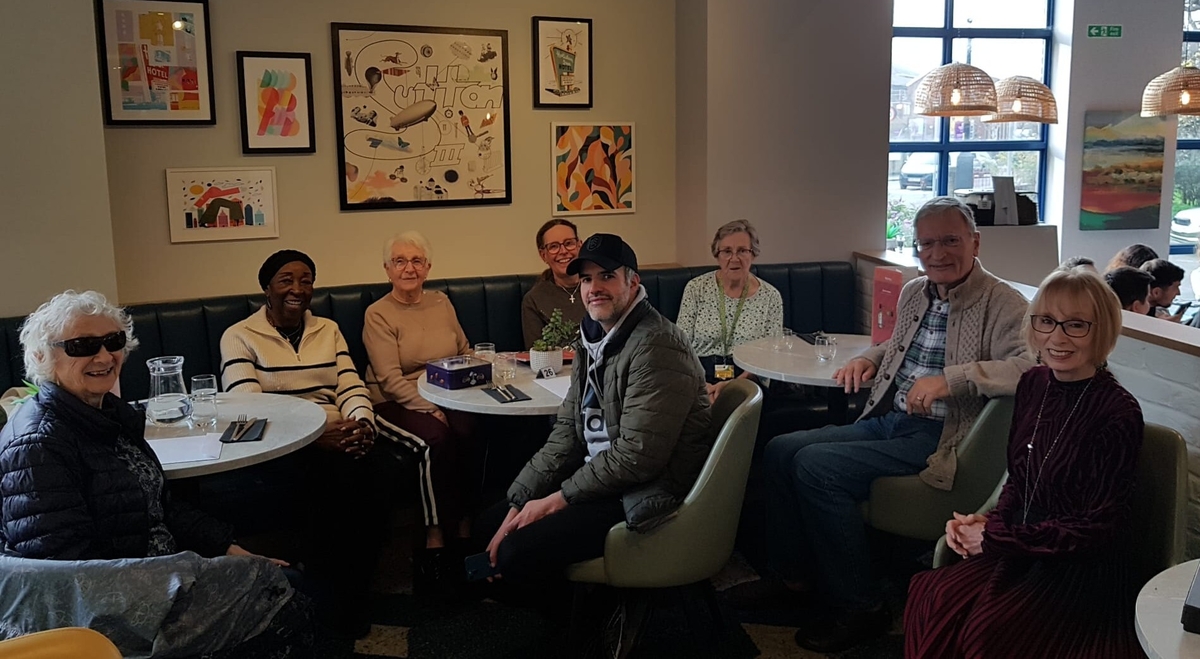The shape of things to come
 David Lowe, musician, disc jockey, journalist, actor and writer speaks creatively and candidly about his life with ET emphasising how important it is not to give up and, to always look for ways to meet the challenges...
David Lowe, musician, disc jockey, journalist, actor and writer speaks creatively and candidly about his life with ET emphasising how important it is not to give up and, to always look for ways to meet the challenges...
My earliest recollection of tremor is a puzzling one that remains etched in my memory to this day.
One night in 1955, when I was nine years old, my parents allowed me to stay-up late to watch a film with them on our little television. The film was an adaptation of the H. G. Wells novel “The Shape of Things to Come” and it troubled me greatly. So much so, that by the end of the film, I was aware that my hands were trembling. When I showed my shaking hands to my parents, instead of comforting words and reassurance, my actions were met by a near-hysterical response from both of them. “You mustn’t do that,” they screamed, “you mustn’t allow yourself to show fear or fright.”
I guess their reaction had a parallel in the old, and similarly flawed, expectation that big boys shouldn’t cry. But, for me, there was something else about my mum and dad’s unexpected anger that I simply couldn’t get my nine year old head around. Put simply, my father had a very noticeable hand tremor, but nobody seemed to be bothered about it, least of all, him. In fact, I clearly remember how, as a joke, he would carry an empty teacup in a saucer, and noisily rattle them both as he walked from the living room into the kitchen. More often than not, these antics resulted in fits of giggles from my mother, and anyone else who happened to be present.
In the years following that “Shape of Things to Come” episode, I became more and more aware that, in moments of stress, my right hand in particular would start to tremble. Naturally, I tried my best to hide the tremor by folding my arms in front of me or behind my back or putting my hands in my pockets. But the more I tried to cover-up the condition, especially from my parents, the more it made its presence felt.
Despite the gradually increasing severity of the right hand tremor, I took-up the guitar in 1961. In truth, the first few minutes of playing were always a challenge, but as I became more proficient, I found the longer I played, the more fluid my finger action and co-ordination became. Happily, I went-on to become a member of a couple of moderately successful London based pop groups. Somehow, though, I knew my guitar playing days weren’t going to last forever.
As disco took hold during the mid-1970s I tired of “live” music and eventually defected to the disc jockey camp by setting-up my own mobile discotheque. Thanks to the cueing levers on the gram decks, I was still able to cue tracks without too much difficulty, but I was continually reminded that the tremor was becoming more problematical. Indeed, by then, drinking a cup of tea, a mug of coffee or a glass of beer was a struggle. I tried to compensate by using two hands and, for a while, that helped, but, as time passed, the tremor began to affect my left hand as well.
Nevertheless, from my earliest days as a DJ, clients and fellow jocks alike remarked, not on my tremulous hands, but on something altogether different. “Hey David, with a voice like yours, you ought to be on radio,” they would say. Eventually I took the hint and began sending audition tapes to radio stations. After several years of trying, I got my big break into radio at Kent’s BBC Radio Medway, in October 1981.
Unfortunately, there were no cueing levers on the BBC studio equipment, but I devised a method of locking my shoulder, elbow and wrist which, although awkward, enabled me to overcome the problem of cueing vinyl tracks. Three years later I moved to Devon where I soon became a member of the DevonAir Radio freelance team. However, after six years with DevonAir, I was lured back to the BBC. Luckily, that return to my radio roots with BBC Radio Devon coincided with the appearance of compact disc technology. Suddenly, my studio activities became very much easier, even though the tremor was worsening all the time in both hands and arms.
Prior to my return to the BBC in 1990, another career opportunity unexpectedly opened-up for me. On the strength of my background in music, I was invited to write a weekly entertainments column for my local daily newspaper, the South Devon Herald Express. That column … called LoweDown … is still going strong. In fact, it celebrated its 23rd anniversary earlier this year.
Looking back, I can see that the technological advances in the BBC studios, and the arrival of computerisation at the Herald Express soon afterwards, assisted my media aspirations enormously. Consequently, the more intrusive effects of my ET tremor were, for a while, reduced to a broadly manageable nuisance level. By way of contrast, these days, dining-out is fraught with self-consciousness and my handwriting ability is falling away fast. Thankfully, though, my personal computer keyboard skills, despite being slow and error ridden, are still hanging-on in there.
While technological help was at hand in my radio and writing careers, nothing has come to the rescue where my head tremor is concerned. I first noticed it in the late 1980s, and it has grown progressively worse ever since. Of all the ET symptoms, head tremor is, by far, the most embarrassing and inconvenient. Indeed, in my case, it has had a significant financial impact as well, by wiping-out my earning potential in TV and film. Until the onset of the head tremor, I was making regular supporting cast appearances in such series as Casualty, Wycliffe and Dangerfield. But, in common with the last vestiges of my guitar playing, my work in TV and film came to an end some ten years ago.
On reflection, I seem to be collecting the ET full set because, over the past year or so, I have begun to notice the tremor affecting my voice. Thank goodness it hasn’t yet compromised my radio work, but one has to be realistic. It clearly has the potential to do so. I suppose that’s why I have, at last, embarked on a process of trying to recoup some of the quality of life lost to ET up to now.
Even here, there have been hurdles to overcome, the most nightmarish of which were extreme reactions to a number of commonly prescribed drugs. So alleviating or reducing the tremor through drug therapy is a non-starter for me. Hopefully, though, a recent referral by my GP will result in a favourable assessment for DBS. Fingers crossed.
In the meantime, I am currently circulating my first novel-length manuscript to literary agents and publishing houses at home and overseas. So my message to fellow ET sufferers is this. DON’T GIVE UP! And don’t become reclusive. Always look for a way to meet the challenge. Very often there is a positive, sometimes quirky, flip-side to the pervasive, negative effects of ET.
In fact I think I’ll close on that very point, by saying … I may not be able to play my guitar any more but, hey, I can still shake a mean tambourine without even trying!













